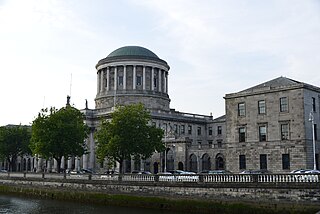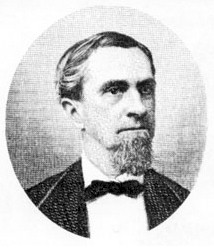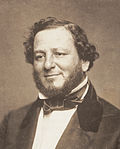
The United States attorney general (AG) is the head of the United States Department of Justice, and is the chief law enforcement officer of the federal government of the United States. The attorney general serves as the principal advisor to the president of the United States on all legal matters. The attorney general is a statutory member of the Cabinet of the United States.

The United States Department of Justice (DOJ), also known as the Justice Department, is a federal executive department of the United States government tasked with the enforcement of federal law and administration of justice in the United States. It is equivalent to the justice or interior ministries of other countries. The department is headed by the U.S. attorney general, who reports directly to the president of the United States and is a member of the president's Cabinet. The current attorney general is Merrick Garland, who has served since March 2021.
In most common law jurisdictions, the attorney general or attorney-general is the main legal advisor to the government. In some jurisdictions, attorneys general also have executive responsibility for law enforcement, prosecutions or even responsibility for legal affairs generally. In practice, the extent to which the attorney general personally provides legal advice to the government varies between jurisdictions, and even between individual office-holders within the same jurisdiction, often depending on the level and nature of the office-holder's prior legal experience.
The Director of Public Prosecutions (DPP) is the office or official charged with the prosecution of criminal offences in several criminal jurisdictions around the world. The title is used mainly in jurisdictions that are or have been members of the Commonwealth of Nations.

United States attorneys are officials of the U.S. Department of Justice who serve as the chief federal law enforcement officers in each of the 94 U.S. federal judicial districts. Each U.S. attorney serves as the United States' chief federal criminal prosecutor in their judicial district and represents the U.S. federal government in civil litigation in federal and state court within their geographic jurisdiction. U.S. attorneys must be nominated by the president and confirmed by the Senate, after which they serve four-year terms.
The Attorney General of Ireland is a constitutional officer who is the legal adviser to the Government and is therefore the chief law officer of the State. The attorney general is not a member of the Government but does participate in cabinet meetings when invited and attends government meetings. The current attorney general is Rossa Fanning, SC.

The Supreme Court of Ireland is the highest judicial authority in Ireland. It is a court of final appeal and exercises, in conjunction with the Court of Appeal and the High Court, judicial review over Acts of the Oireachtas. The Supreme Court also has appellate jurisdiction to ensure compliance with the Constitution of Ireland by governmental bodies and private citizens. It sits in the Four Courts in Dublin.

The Judiciary Act of 1789 was a United States federal statute enacted on September 24, 1789, during the first session of the First United States Congress. It established the federal judiciary of the United States. Article III, Section 1 of the Constitution prescribed that the "judicial power of the United States, shall be vested in one Supreme Court, and such inferior Courts" as Congress saw fit to establish. It made no provision for the composition or procedures of any of the courts, leaving this to Congress to decide.

The Illinois attorney general is the highest legal officer of the state of Illinois in the United States. Originally an appointed office, it is now an office filled by statewide election. Based in Chicago and Springfield, the attorney general is responsible for providing legal counsel for the various state agencies including the governor of Illinois and Illinois General Assembly, as well as conducting all legal affairs pertaining to the state.

John Archibald Campbell was an American jurist. He was a successful lawyer in Georgia and Alabama, where he served in the state legislature. Appointed by Franklin Pierce to the United States Supreme Court in 1853, he resigned at the beginning of the American Civil War, traveled south and became an official of the Confederate States of America. After serving six months in a military prison at war's end, he secured a pardon and resumed his law practice in New Orleans, where he also opposed Reconstruction.

The Supreme Court of Florida is the highest court in the U.S. state of Florida. It consists of seven justices—one of whom serves as Chief Justice. Six members are chosen from six districts around the state to foster geographic diversity, and one is selected at large.

The attorney general of North Carolina is a statewide elected office in the U.S. state of North Carolina. The attorney general is a constitutional officer responsible for representing state agencies in legal matters, supplying other state officials and prosecutors with legal advice, and leading the North Carolina Department of Justice. The incumbent attorney general, Josh Stein, assumed office on January 1, 2017. The position of attorney general dates back to North Carolina's colonial history. North Carolina's 1776 constitution established the office as an official appointed by the North Carolina General Assembly. The state's 1868 constitution made the attorney general an elected executive official with their duties prescribed by law. Since 1971, the officer has sat on the North Carolina Council of State.
Gonzales v. Oregon, 546 U.S. 243 (2006), was a landmark decision of the US Supreme Court which ruled that the United States Attorney General cannot enforce the federal Controlled Substances Act against physicians who prescribed drugs, in compliance with Oregon state law, to terminally ill patients seeking to end their lives, commonly referred to as assisted suicide. It was the first major case heard by the Roberts Court under the new Chief Justice of the United States.

George Davis was a Confederate politician and railroad counsel who served as attorney general of the Confederate States for 480 days in 1864 and 1865.
Wade Keyes was a lawyer, scholar, judge and professor from Alabama who served as the first and only Assistant Attorney General of the Confederacy, 1861–1865. After the Civil War he practiced law in Florence, Alabama.

The government of the U.S. State of Oklahoma, established by the Oklahoma Constitution, is a republican democracy modeled after the federal government of the United States. The state government has three branches: the executive, legislative, and judicial. Through a system of separation of powers or "checks and balances," each of these branches has some authority to act on its own, some authority to regulate the other two branches, and has some of its own authority, in turn, regulated by the other branches.

The Oregon Attorney General is a statutory office within the executive branch of the state of Oregon, and serves as the chief legal officer of the state, heading its Department of Justice with its six operating divisions. The attorney general is chosen by statewide partisan election to serve a term of four years. The incumbent, Ellen Rosenblum, was sworn in on June 29, 2012, replacing John Kroger, a Democrat who was elected in 2008 and resigned six months before the end of his term to become President of Reed College. She was re-elected in 2016 and 2020.

As established and defined by the Kentucky Constitution, the government of the Commonwealth of Kentucky is composed of three branches: the Executive, Judicial, and Legislative.

Keating v. Edmondson, 2001 OK 110, 37 P.3d 882 (2001), was an Oklahoma Supreme Court case that ruled that the Governor of Oklahoma could not alter the structure of his Cabinet without the approval of the Legislature. The case was primarily concerned with the Governor–Legislature relation. The case is unique because the two parties in the case were both state-wide elected officials:
The Confederate Civil Service was the civil service of the Confederate States of America.















